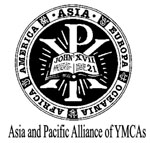|
The BTC's primary aim is to capacitate the new and younger professional secretaries of YMCAs of the Asia Pacific region not provided with necessary training facilities in their respective YMCAs. Moreover, the BTC is a deliberate attempt to strengthen the YMCA staff's capacity as a community-based people-centred organization. Mindful of the changes and challenges to leadership development and leadership practice in strengthening the relevance of the movement. The 2020 training course module is a shortened version of the original face to face training program module due to virtual meetings' limitation.
Together We Stand for Just Peace Towards A Better World was an overarching theme to discourse and articulate the contextual realities from the perspectives of justice and peace. Very much rooted in our Christian faith, and the core concerns in the Asia Pacific context, as our faith upholds that and motivates us to strive for Justice and Peace for a better world.
The participants explored the areas of Contemporary Christian Theology; Ecumenism& Ecumenical Movements; History & Mission, Structure, Governance system of YMCA; YMCA’s response to Contextual Realities and Social Analysis; Sustainable Development Goals (SDGs); Quadrennial Program Plans of APAY- Alternative Tourism; Interfaith and Peacebuilding; Youth Empowerment; Gender Justice; Disaster risk management, etc., Mission and Vision of different YMCAs they belong.
Dr. Ahn Jae Woong, (Chair- Board of Trustees at the NCY – Korea), Dr. Raj Bharath Patta, (Presbyter at the Stockport Methodist Circuit in the UK), Gen. Secretary APAY-Nam Boo Won, Ms. Cristina Miranda,(Exe Secretary APAY), Mr. Chan Beng Seng,(Coordinator- GATN- APAY) Dr. Muriel Montenegro, (Coordinator ICF- APAY), Mr. Edward Ong (International Service Director – Y’s Men’s International), Ms. Sunita Suna( Exe Secretary -APAY and organizer of the BTC) facilitated the sessions through thematic inputs, presentations, discussions- including breakout group discussions, Q&A sessions, etc.
The BTC was designed to use the participants as resource people, to share their contextual realities and their YMCA’s responses. It was relevant to hear from them as they are connected with the grassroot communities. As Dorothy from Malaysia said, “there is much more to learn from each other as colleagues from YMCAs.”
They also highlight the socio, political, economic realities, the problems and challenges, and how their YMCAs respond to those challenges? Their presentations also featured the situation of the ongoing COVID19 Pandemic in their countries.
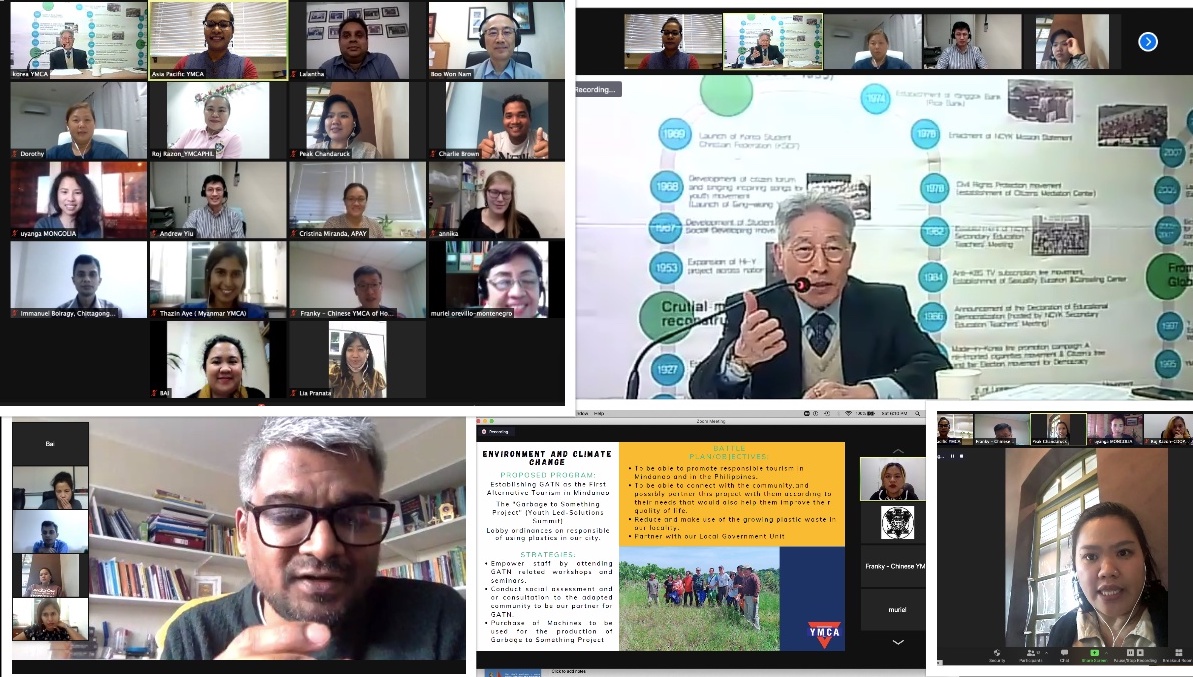 |
| ↑ Resource persons Dr. Ahn Jae Woong, Dr Raj Bharath Patta facilitating session |
The basic training course was also an opportunity to reflect and introspect the work of different YMCAs in line with the mission, vision, identity.
A summary of the reflections are:
-
 How the work of different YMCAs guided by the mission and vision of the YMCAs as the participants revisited the APAY's fundamental principles and documents, such as the Paris Basis, Kampala Principle- Challenge 21. This certainly broadened their understanding of the history, mission, vision, structure, identity, and importance of the YMCA's governance system -the foundation of the organization. How the work of different YMCAs guided by the mission and vision of the YMCAs as the participants revisited the APAY's fundamental principles and documents, such as the Paris Basis, Kampala Principle- Challenge 21. This certainly broadened their understanding of the history, mission, vision, structure, identity, and importance of the YMCA's governance system -the foundation of the organization.
- Christian faith is an integral part of the YMCA. Contemporary Christian Theology- faith and praxis in public spheres challenged us to relate our Christian faith to the contextual realities. Faith and praxis should go hand in hand, and faith must motivate and inspire us to express our faith in public spheres by taking action against any kind of violation of God’s creation.
- How do we understand YMCA, an ecumenical movement, especially in the Asian context? How ecumenical movements like YMCA should be focused on being “gospel-centered” and “life-centered.” “mission-oriented,” “peace-oriented,” “justice-oriented,” and “value-oriented”?
-
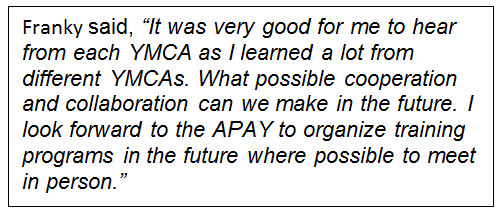 YMCA in the Asia Pacific region has diverse identities due to its diverse contexts. Identifying the problems, challenges, and social issues based on our geographical locations is crucial to enable YMCAs' actors to respond to the realities they confront in their communities. Hence, the social analysis of the unjust structure of socio, political, and economic realities significantly reshapes our perspectives and approach to address social justice issues. YMCA in the Asia Pacific region has diverse identities due to its diverse contexts. Identifying the problems, challenges, and social issues based on our geographical locations is crucial to enable YMCAs' actors to respond to the realities they confront in their communities. Hence, the social analysis of the unjust structure of socio, political, and economic realities significantly reshapes our perspectives and approach to address social justice issues.
- Why and how YMCA should address the 2030 UN Agenda - the Sustainable Development Goals (SDGs)? What are the opportunities we have in networking and collaborating with the CSOs in our local communities in responding to the SDGs?
The Quadrennial Program Plans (2020-2023) guides our actions or interventions through programs and activities develop based on the Challenge 21. The ongoing programs like - Alternative Tourism- travel the YMCA way, Interfaith, and Peacebuilding with communities youth empowerment, gender justice, disaster risk management, etc. The BTC guided on how the issues and programs can be realized at the YMCA of Asia Pacific's local or grassroots levels.
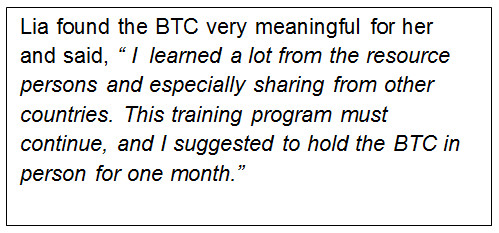 At the end of the training, participants shared the plan of actions based on the mission and vision of YMCAs, integrating the input at the BTC for the local YMCAs. Some program proposals to bring as recommendations to the national YMCA leadership. Participants shared their overall experiences of virtual BTC and gave feedback for the future virtual program/training. At the end of the training, participants shared the plan of actions based on the mission and vision of YMCAs, integrating the input at the BTC for the local YMCAs. Some program proposals to bring as recommendations to the national YMCA leadership. Participants shared their overall experiences of virtual BTC and gave feedback for the future virtual program/training.
Though most participants found the BTC meaningful and beneficial for their work, there were limitations and challenges to organizing a two-week training online. This was the first time for the organizers and the participants to experience virtual training. We received valuable feedback from participants, and there are lessons learned to improve the BTC if we have to hold it virtually in near future.
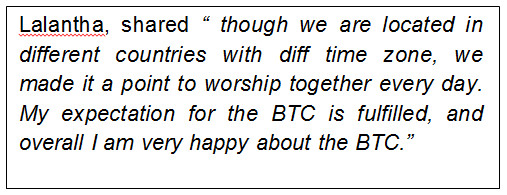 Overall, despite the limitations of the virtual training, the two weeks basic training program provided a common space/platform for the leaders of local YMCAs and have deepened understanding, developed perspectives, new insights, friendship, partnership, networks to work together with common goals. BTC was also a place to pray and worship together to draw inspiration from our faith. All participants expressed that the BTC was meaningful and helpful to perform their roles effectively and meaningfully. Overall, despite the limitations of the virtual training, the two weeks basic training program provided a common space/platform for the leaders of local YMCAs and have deepened understanding, developed perspectives, new insights, friendship, partnership, networks to work together with common goals. BTC was also a place to pray and worship together to draw inspiration from our faith. All participants expressed that the BTC was meaningful and helpful to perform their roles effectively and meaningfully.
A graduation ceremony was conducted on the final day of the BTC. Apart from the GS and the APAY staff, the president of APAY Chen-Chin Seng also joined the last day program and delivered congratulatory remarks to the participants, followed by words of encouragement by GS Nam Boo Won. An electronic certificate was given to the participants. APAY is grateful to Asia Pacific Area and Korea Area of YMI for their generous ASF contribution to the BTC this year.
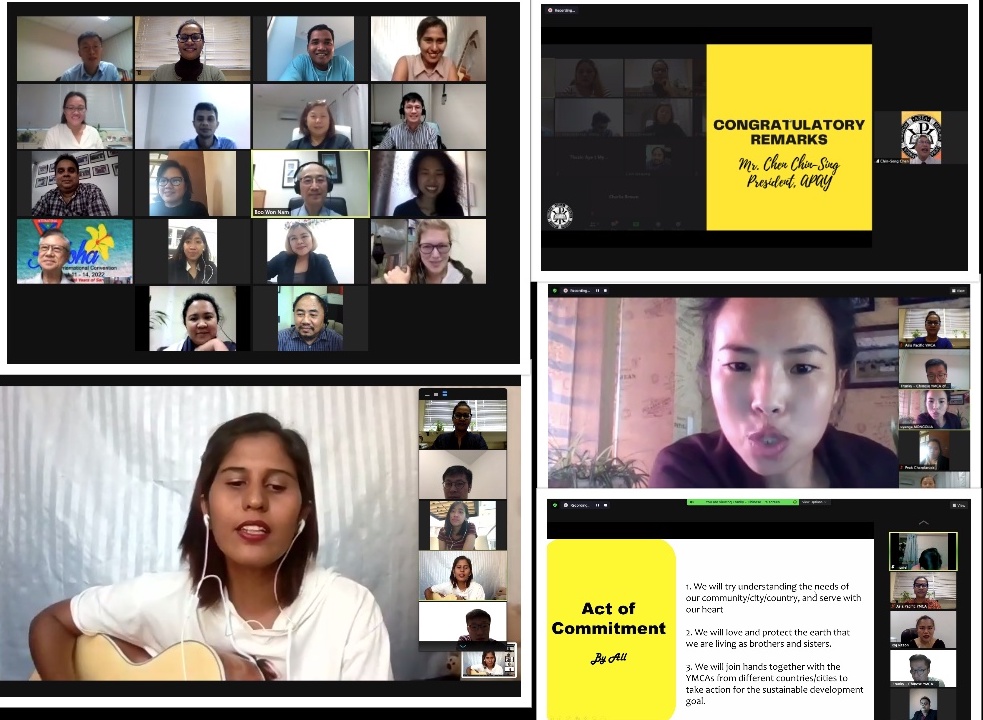 |
| ↑ Last day of BTC - President Chen Chin-Seng delivered congratulatory remarks |
~ Sunita Suna, Executive Secretary for Programs
APAY invites the members of YMCAs to participate in the 16 Days of Activism against Gender-Based Violence
The Gender Equity Committee (GEC) meeting was held virtually on November 25, at 4 PM HKT, attended by nine members, including the General Secretary of APAY. The meeting was presided by the newly elected chairperson Dr. Meerha Hahn.
It was planned to hold the meeting on the 25th of November to symbolically launch the 16 days of activism against gender-based violence, which starts on November 25 and runs until December 10, International Human Rights Day. The meeting started with opening worship based on gender justice on the theme Together We Stand against Sexual and Gender-Based Violence. A reflection was shared by the chairperson on the bible text Galatians 3:28.
GEC members discussed the Quadrennial Program Plan (QPP) on gender justice and the proposed programs/ activities to implement under the gender justice programs in 2020-2021. The proposed programs of 2021 are face to face programs, and that might be difficult to implement due to the continuous concerns on COVID19 pandemic. Therefore, the members discussed how to convert the face to face programs to virtual programs/ workshops/webinars? The GEC members will meet again on December 8 to continue to discuss and decide on the virtual programs for 2021.
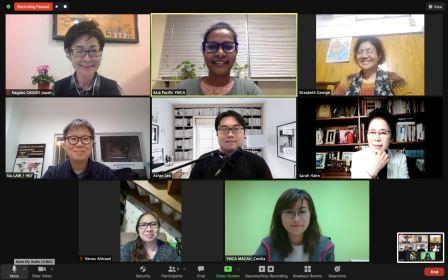 |
| ↑ Gender Equity Commttee members during the virtual meeting |
Together We Stand Against Sexual and Gender-Based Violence
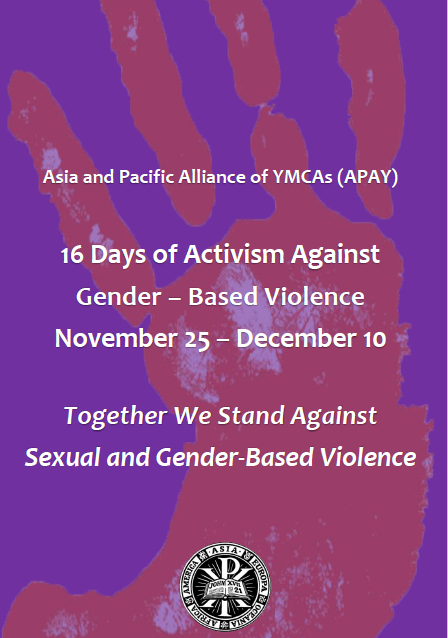 The GEC members have symbolically launched the 16 Days of Activism against Gender-Based Violence (GBV) on November 25 the annual international campaign that begins on 25 November, the International Day for the Elimination of Violence against Women, and continues until 10 December, the Human Rights Day. Together with the GEC, the Asia Pacific YMCAs (APAY) has chosen the theme Together We Stand Against Sexual and Gender-Based Violence and invite men and women to actively participate in the “16 days campaign”. As YMCA actively taking part in the global campaign of 16 days of activism against sexual and gender-based violence against women, is an affirmation to Challenge 21 that we believe in a gender just and inclusive society and this is a sign of commitment for our constituencies. The GEC members have symbolically launched the 16 Days of Activism against Gender-Based Violence (GBV) on November 25 the annual international campaign that begins on 25 November, the International Day for the Elimination of Violence against Women, and continues until 10 December, the Human Rights Day. Together with the GEC, the Asia Pacific YMCAs (APAY) has chosen the theme Together We Stand Against Sexual and Gender-Based Violence and invite men and women to actively participate in the “16 days campaign”. As YMCA actively taking part in the global campaign of 16 days of activism against sexual and gender-based violence against women, is an affirmation to Challenge 21 that we believe in a gender just and inclusive society and this is a sign of commitment for our constituencies.
A liturgy is prepared on the theme and sent to all the national movements to observe the campaign.
The members were also invited to participate in the 16 days of activism against sexual and gender-based violence in different ways. Some ideas are shared below to participate in the campaign:
- Join the local civil society organizations campaign
- Observe the Thursday in Black
- Organize webinars at the local level on GBV
- Participate in events/ activities organized by the Interfaith Cooperation Forum (ICF) for 16 days of activism
- Use social media to advocate and campaign to end GBV and use the #16daysofactivism and #APAYWOMEN
- Organize prayer meetings to worship together to end violence against women and girls
~ Sunita Suna, Executive Secretary for Programs
ICF held Two Sessions of Thematic Workshop on the Intersection of Religion, Gender, and Human Rights
ICF held the first two out of four sessions of the Virtual Thematic Seminar-Workshops on the Intersection of Religion, Gender, and Human Rights on November 19 and November 26, 2020, with over 30 participants from more than eight countries.
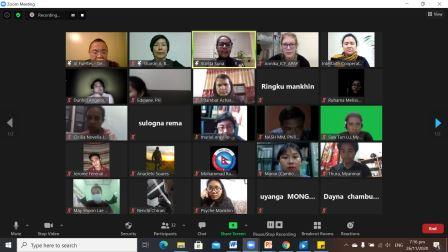 |
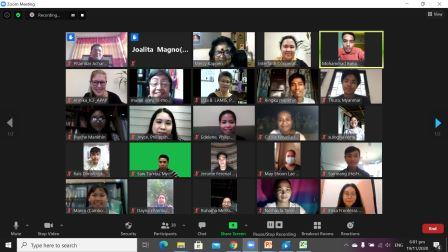 |
| ↑ Participants of the Virtual Thematic Workshop on Nov 19, 2020 |
↑ Participants of the Virtual Thematic Workshop on Nov 26, 2020 |
The four workshops are in line with the 16-Day of activism against gender-based violence, which started on November 25th. ICF organized all workshops on Thursdays to promote and participate in the campaign by UN’s World Council of Churches’ #ThursdaysinBlack. WCC calls on women and men to wear black on Thursdays to indicate one’s commitment to be part of the global movement in “resisting attitudes and practices that permit rape and violence, and to “show respect for women who are resilient in the face of injustice and violence.”
For the first session on Religion, Femicide, and Various Forms of Sexual Abuse, ICF was very happy to have Dr. Liza Lamis, the Executive Secretary of the International Fellowship of the Least Coin, and Ms. Mercy Kappen, the Executive Director Vishtar Academy of Justice and Peace in Bangalore India, as speakers. Both gave powerful and insightful presentations. Dr. Liza Lamis focused on the harmful interpretation of the Bible that results in violence against women. She also presented Christianity’s long tradition with ancient famous thinkers promoting harmful practices. She further challenged the participants to look into their own sacred texts and identify connections between the harmful practices towards women and the interpretation of sacred texts. Following Dr. Lamis, Ms. Mercy Kappen gave an insightful talk by first providing a comprehensive definition of violence against women as well as devastating current statistics. She further explained common practices of victim-blaming and debunked myths and beliefs around these practices. She further pointed out the importance of intersectionality to tackle the issue of violence against women in its complexity.
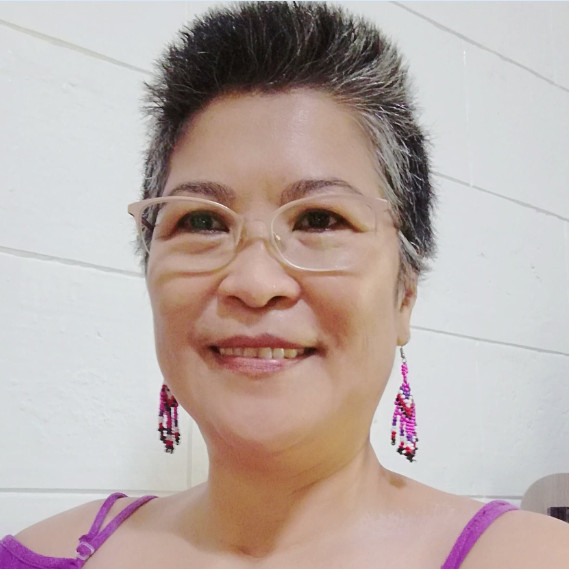 |
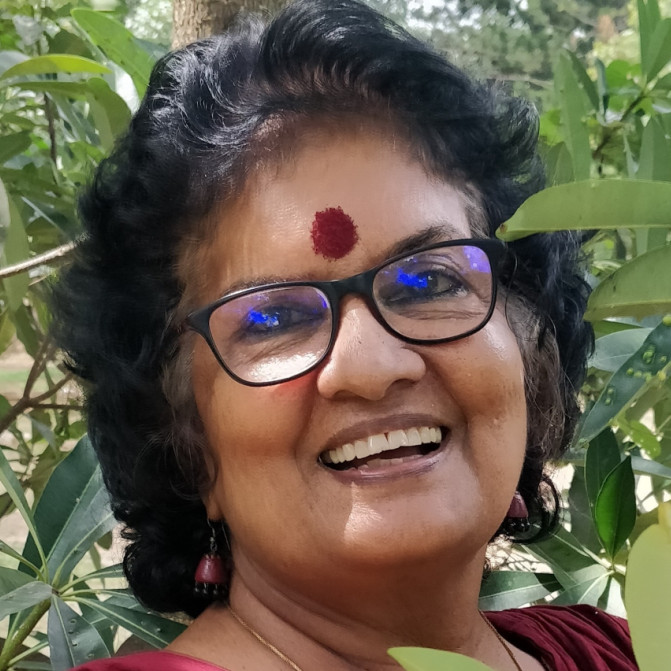 |
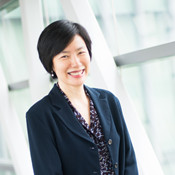 |
 |
| ↑ Dr. Liza Lamis |
↑ Ms. Mercy Kappen |
↑ Dr. Sharon Bong |
↑ Dr. Al Fuertes |
The second session was held on November 26, 2020, about Religion and LGBT Communities: “Is God’s Love Exclusive for the Straight People?” ICF was very pleased to welcome Dr. Sharon Bong, an Associate Professor of Gender Studies at Monash University-Malaysia, and Dr. Al Fuertes, an Associate Professor at George Mason University in Virginia, USA, specializing in psycho-social trauma healing as an important component of conflict transformation. Dr. Sharon Bong gave a very insightful presentation starting with a brainstorming exercise for all participants on what sexuality is, and then moved towards sexual ethics theory. She explained what our societies and religions perceive and deem as normal and what the actual reality and diversity of gender identities and sexual orientation look like. Following Dr. Bong’s inspiring presentation, Dr. Al Fuertes gave a very powerful personal account about growing up gay in a religious community and finding the courage of coming out of the closet years later through a devastating personal loss. A fruitful discussion with both our resource persons followed their presentations.
We, at ICF, are very thankful for all our speakers who accepted our invitations and thereby made this series of workshops possible. We are also happy to have so many young people attend and further engage with the session topics by writing reflections and joining every Tuesday in an open zoom space for further discussion and reflection.
~ Annika Denkmann, BftW Seconded Personnel to ICF
We only have one planet
We only have one planet. We should all do our part to ensure that it’s protected by combining our ways of living with a deeper respect and understanding of what nature provides. The nature provides us foods, natural resources and cleans air in the beginning. But as human, we have been consuming more than what we need. We are following the modern ways of living, invention to high technologies and materials. We rarely consider whether the materials we use are what we ‘need’ or simply what we “want”. We use materials without regard for the effects of our consumption to the future generation.
Today, we are facing a lot of environmental impacts in our daily life such as global warming, climate change, water pollution, air pollution, soil pollution, plastic pollution and other ecological problems. Approximately seven (7) million people worldwide die prematurely each year from air pollution, with about four (4) million of these deaths occurring in Asia-Pacific. Ninety-two per cent of people worldwide does not breathe clean air and air pollution costs the global economy $5 trillion every year in welfare costs.
Plastic pollution is also big issue for water pollution and air pollution. People are using a lot of plastic products. It becomes waste to oceans and landfills. Plastic waste is littering our oceans and threatening the lives of millions of marine animals. Seals, whales, dolphins, seabirds, fish, crabs and many other sea animals are dying and becoming sick because of this deadly environmental concern.
So, what should we do for the environmental conservation for our future generation. For the sustainable development in our lives, we have to balance environment, social and economic sectors. We need to develop these three things equally. We need to evaluate ourselves- what are our bad habits and what behavioral changes we must do.
Promoting Environmental Conservation good practices
Myanmar YMCA is one of the organizations working for the environmental conservation in Myanmar and environment conservation is one of its organization values. Myanmar YMCA is promoting environmental conservation awareness to the people in the community by conducting training, workshop, tree planting campaign, plastic collecting campaign, and bicycle campaign. The staff members and volunteers have the chance to participate in International Green Ambassador training and Climate Change e-learning program that are organized by APAY and Chiang Mai YMCA. We learned a lot of things and good practices from these training and courses.
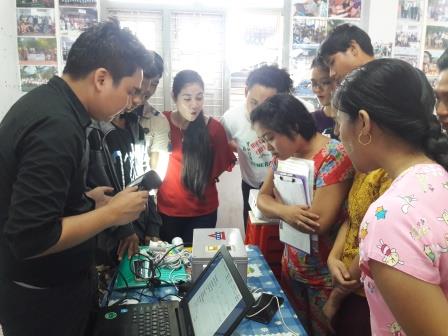 |
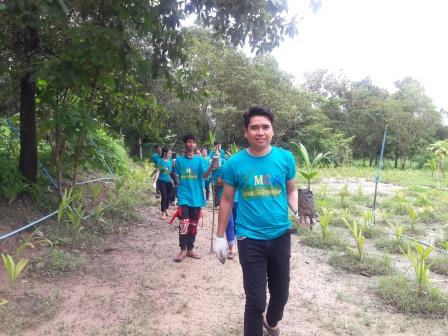 |
| ↑ Conducting Environment Conservation Training |
↑ Tree Planting |
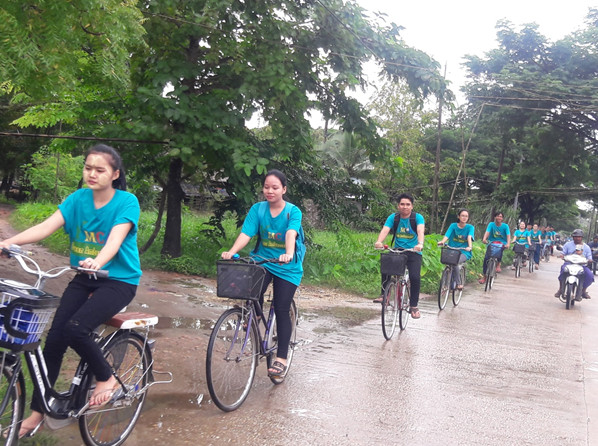 |
| ↑ Bicycle Campaign for reduce Co2 in transportation |
Changed LED light bulb to reduce electricity
To reduce carbon emission and greenhouse gas, we need to reduce electricity in our daily life. Y’s Men Club International (YCI) supported Myanmar YMCA to change the LED light in the office. The LED light bulb was an effective way for the YMCA to reduce not its CO2 emission but also the electricity costs. Moreover, a no use of air con during Wednesday in YMCA office contributes to lesser carbon emission..
Garden Reading Corner
A Garden Reading Corner is also created in the office. It is decorated with flowerpot in in order to reduce stress. Every staff member has to reduce the plastic and paper consumption in the office. Every Friday, all the staff members have to participate in plastic collecting campaign and garbage cleaning around the office. Myanmar YMCA staff also follows a waste management. Each of them are aware of the principle of Reduce, Reuse, Recycle and Avoid.
Environmental conservation comes in many forms and it reminds us to be mindful of our daily choices. No matter how busy our lives are, it remains fairly easy to make small, yet necessary, changes for the good of the Earth. We can do so many things for environmental conservation, but starting with small action can make a difference especially if we work together.
~ Saw Tun Lu (Myanmar YMCA)
Tourism, Climate Change and Travel the YMCA way
The travel and tourism industry has a high climate and environmental footprint, requiring heavy energy and fuel consumption and placing stress on land systems. Flights taken to reach tourist destinations cause more CO2 emissions than all local activities combined, with severe consequences for climate change. It has been estimated road and air travel to destinations contribute over 70% of the total carbon footprint of each trip.
The travel and tourism industry contributes to around 8% of global greenhouse gas (GHG) emissions as a result of aviation (40%), transportation (30%) and the consumption of goods and services (30%) including food and accommodation (Lenzen et al., 2018). The UNFCCC claimed that 8% is enormous and not sustainable. 8% makes the industry a bigger polluter than the construction industry. Travel and tourism-related transport CO2 emissions are predicted to increase to almost 2 million tonnes by 2030, a 25% rise from 2016 to 2030. The growth of travel and tourism over recent years has put achieving the targets of the Paris Agreement at risk.
During this time of COVID-19 pandemic travel and tourism is one of the industries most affected. On the one hand, there has been some reprieve in terms of reduction of GHG emissions, but on the other hand, it is impacting economies, livelihoods, public services and opportunities on all continents. Both the Governments as well as the travel and tourism industry are struggling to revive and kickstart traveling again.
From the perspective of climate change, this crisis presents to us an unprecedented opportunity to reform and transform the relationship of tourism with nature, climate and the economy. It is time to rethink how this industry impacts our natural resources and ecosystems, building on existing work on sustainable tourism; to examine how it interacts with our societies and other economic sectors; to measure and manage it better; to ensure a fair distribution of its benefits and to advance the transition towards a carbon-neutral and resilient tourism economy. We should take this opportunity to change the nature or traditional understanding of tourism by developing and promoting responsible and sustainable perspectives and practices on tourism by introducing responsible and sustainable activities at the destinations – focus on low carbon activities and carbon mitigating activities.
As travel restarts in some parts of the world, many YMCAs will also begin to plan programs that would involve traveling to an activity venue. We want to encourage you to Travel the YMCA way.
We hope that this GATN campaign on Traveling the YMCA way can transform not just our travel behaviour but will help us to adopt a more responsible and sustainable daily lifestyle, too.
Below are some simple steps to begin our responsible and sustainable lifestyle and to combat climate change.
- Watch our consumption habits, especially electricity and water.
- Eat local foods. Imported foods and products have a high carbon footprint.
- Minimize driving by setting concrete reduction goals and walking, biking, carpooling and using public transit as much as possible. Set a goal of walking or biking anywhere within 2 km of your home.
- Fly less and, when you do fly, make your travel count and justify your carbon footprint:
- travel with a purpose -- not just for pleasure or leisure
- choose green hotels and encourage hotels you visit to green their practices
- mitigate your travel and consumption with carbon neutral or carbon negative activities
- make sure the local communities benefit from your travel-- support the local economies, contribute to local development, support local NGOs and community services projects
~ Chan Beng Seng, GATN Coordiator
|
